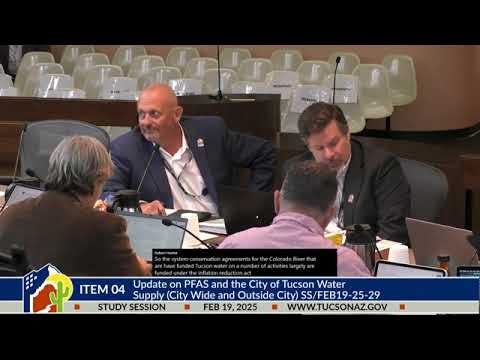Tucson officials have painstakingly worked on water conservation efforts for decades, but a lot of that progress could now be in jeopardy.
Tens of millions of dollars in water projects are on hold as the city figures out what the federal government will do next.
For now, Tucson is effectively pausing six grant-funded projects as they wait for answers - or at the very least, checks - from the federal government.
The city has roughly $284 million in signed grant agreements with the feds, although most are pledged for future projects.
While contracts have been signed and the city continues to hold up its end of the deal, even Tucson City Manager Tim Thomure can’t predict what is going to happen next.
The uncertainty surrounding federal funding suggested at least one part of city government - the city’s housing development department - could be facing layoffs if federal funding dries up.
Overall, the Council’s agenda on Wednesday was light on action, approving a handful of routine measures including approving liquor licenses, plans for a subdivision and a car wash business.
That was a stark difference from the long discussion among the Pima County Board of Supervisors earlier in the week — who pushed forward with long-range plans for Pima County.
Mayor Regina Romero did say she was concerned about future funding from Housing and Urban Development, and sent a letter to Sens. Mark Kelly and Ruben Gallego reminding them that the city depends on HUD funding to combat homelessness.
“Eliminating half of HUD’s workforce would be disastrous for Tucson’s Housing and Community Development Department, which relies on HUD for 95% of its budget. The potential loss of these vital resources would hinder our ability to provide essential services, including rental assistance for low-income households, the operation and maintenance of public housing, and efforts to address and prevent unsheltered homelessness,” Romero wrote in her letter.
Budget talks: There is some good news coming out of City Hall. Officials are expecting some of its revenue will exceed their initial expectations for this fiscal cycle.
But Thomure quickly threw cold water on any potential celebrations, reminding the Council (and the public) that the money can’t just be used for whatever program or department needs it.
For instance, the city can’t take unexpected surpluses out of the water utility and use those dollars to hire more Tucson Police Department officers or put it into road repairs.
But it wasn’t all good news on the financial front.
The rising health care costs for employees, particularly the cost of prescriptions, are going to take a toll on the budget.
Rebates from certain drug companies — historically used to offset the cost of some medications — are drying up, staff told the Council.
The financial update comes just two weeks after dozens of union employees who work at the city demanded a pay raise at a council meeting.
Although the council didn’t address that issue on Wednesday, it’s likely going to be a big part of budget talks this spring.
Skate park gets green light: The council voted unanimously to build the Cushing Street Skate Park, with a groundbreaking set for next month. The $2.6 million project has been in the works for nearly a decade.
The council signed off on an intergovernmental agreement with the state for the project, which will be funded by the city, community donations, and grants from the Pascua Yaqui Tribe and the Tohono O’odham Nation.
Same park, new name: The council also voted unanimously to rename Christopher Columbus Park. The park will now be known as Danny Lopez Park, named after a well-respected Tohono O’odham elder and teacher who passed away in 2008.
The vote came after Councilman Kevin Dahl passed around a photo with Lopez and His Holiness the Dalai Lama, and Lopez’s wife said she supported renaming the park.
Honoring a leader: The council added Dolores Huerta, the co-founder of the National Farm Workers Association, to the name of a city-observed holiday, which will now be the “Cesar E. Chavez and Dolores Huerta” day.
“This is the right time to make the change because history is the choices we make every day,” Romero said.
Flipping the switch: Several people at the call to the public urged the council to break away from Tucson Electric Power and establish a municipal-owned utility.
It’s an idea that’s been simmering for a while now, and likely will need to be embraced or discarded before voters decide whether to continue a 25-year franchise agreement with TEP. The current agreement expires next year.
It’s not looking good for Interstate 11. The Federal Highway Administration and the Arizona Department of Transportation have been ordered to pause planning activities and reassess the proposed I-11 going through southern Arizona, effectively putting a nail in the coffin of this controversial new trade route from Mexico to Canada.
Their decision follows the ongoing lawsuit filed by the Coalition for Sonoran Desert Protection, the Center for Biological Diversity, Tucson Audubon Society, and Friends of Ironwood Forest in opposition to the 280 miles of new highway through undeveloped land between Nogales and Wickenburg.
U.S. District Court Judge John Hinderaker, appointed by Donald Trump in 2020, ordered a new environmental reassessment of the proposed route.
Pima County has opposed a route going through Avra Valley since 2007. The City of Tucson, Sahuarita, the U.S. Bureau of Reclamation, the U.S. National Park Service and Congressman Raul Grijalva have all come out against the plan as well.
As you can see, there’s a lot going on at City Hall. Subscribe to the Tucson Agenda today and we’ll help you keep track of what your elected officials are doing.
As part of our ongoing series detailing how City of Tucson officials want to spend the estimated $800 million that would be raised if Proposition 414 passes next month, today we’re looking at call volumes for the Tucson Fire Department.
Supporters for Prop 414 have said both the city police and fire departments need more resources, which would include $7.1 million every year to hire more firefighters if the measure passes.
Tucson Fire Department Chief Chuck Ryan told the Council on Wednesday that call volume continues to increase year over year.
“Our call volume, over time, has grown dramatically here in the city,” he said. “I arrived in Tucson in late September 2019 and that year we had 87,000 calls for service. Last year, we concluded with just shy of 106,000 calls.”
Put it another way, call volume for the fire department has gone up 23% in five years. An overwhelming majority of the calls are medical related.
The context of the discussion is important as Ryan was not talking about Prop 414, but instead about whether the city is well-prepared for urban wildfires in light of the recent devastating fires in Los Angeles that destroyed 16,400 structures and killed at least 29 people.
What do you think? Should the city spend $7.1 million every year in Prop 414 money to hire more firefighters?
If you’d like to participate in polls like this one, click that button and upgrade to a paid subscription!
Punching down: GOP Sen. Jake Hoffman wants to put a bounty on catching undocumented immigrants. A bill he introduced would provide $2,500 to local law enforcement agencies that arrest an immigrant who ends up getting deported, the Republic’s Stacey Barchenger reports. The money would come from a proposed fee on international wire transfers. A spokesman for Gov. Katie Hobbs said “there’s no way in hell” she would sign it into law.
Not sparing the children: As the Trump administration moves ahead with its crackdown on immigration, they’re turning to children who cross the border without their parents. The administration halted a program that provides legal aid to migrant children, setting up the situation where “children so young their feet can't touch the floor when they sit in courtroom chairs” will be left without representation in immigration court, the Associated Press reports. That could affect a lot of children in Arizona. Over just the past four months, more than 4,000 unaccompanied migrant children crossed the Arizona-Mexico border, the Arizona Mirror’s Gloria Rebecca Gomez reports.
Going after DEI: Amid uncertainty over federal funding in the wake of President Donald Trump’s executive orders, University of Arizona officials took down websites for the school’s Office of Diversity, Equity and Inclusion and Cultural and Resource Centers, the Arizona Daily Star’s Prerana Sannappanavar reports. The Trump administration is pushing universities to dismantle their DEI programs, or lose out on millions of dollars in federal funding. Earlier this week, UA officials said they were taking an inventory of those programs. When the Star asked those officials about shutting down the websites, they stayed mum. A UA spokesman offered up a bland statement about “taking a measured approach toward ensuring compliance with new policies and procedures.”
Five words: The UA also changed its Land Acknowledgement statement by removing the phrase "committed to diversity and inclusion." Law student Jacquelyn Francisco, who was attending the university’s 4th Annual Tribal Leaders Summit Student Meet & Greet on Wednesday, was met with resistance when trying to address her fellow students about the issue. When she was allowed to speak, she said "Being committed to diversity and inclusion means standing by those words, not erasing them" and demanded the university restore the original statement as drafted by tribal leaders in Arizona.
Circling back: Tucson officials are hosting forums on March 5 and March 8 to talk about permits for distributing food in local parks, the Tucson Sentinel’s Natalie Robbins reports. The issue came up at a Tucson City Council meeting in November, when Councilmembers Karin Uhlich and Lane Santa Cruz relayed concerns from community groups who wanted more flexibility to help unsheltered people in parks. If you’re interested in the March 5 forum, you can attend via Zoom. The March 8 forum is in-person.
Learning from the past: Arizona could soon be one of the first states to cover traditional healing practices in its Medicaid program, the Republic’s Stephanie Innes reports. A state Senate panel approved SB1671 from Tucson Democratic Sen. Sally Ann Gonzales, which would provide $1.3 million from the General Fund starting next year for practices like sweat lodges, prayers, and songs. If the full Legislature passes it, Hobbs is expected to sign the bill into law.
Wow, these kids sure can spell.
Curt won his school’s eighth-grade spelling bee, so he’s always watching for the winning word at local spelling bees.
This year, it was “miscible,” which describes ingredients that form a homogenous mixture when combined.
Curt and Joe work with words all day and even we wouldn’t have spelled that one correctly. But Bryant Banzhaf did.
The sixth grader at Rattlesnake Ridge Elementary School nailed it and won this year’s Pima County Spelling Bee. Following close behind were Carter LaFrance, a seventh grader at Calvary Christian School, and Judah Abbey, a sixth grader at Leman Academy of Excellence.
Congrats to all three!









